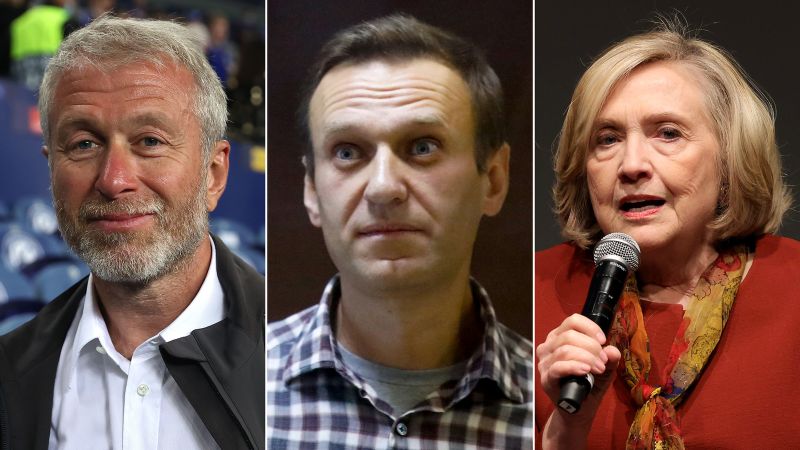
Russian oligarch went to Moscow in effort to broker complex prisoner exchange that included Navalny, sources say
A two-year stop-start process exploring options to secure the release of Navalny began to accelerate when Abramovich visited Moscow in recent months, two of the sources said.
Former US Secretary of State Hillary Clinton had also embraced early efforts to win Navalny’s freedom, according to several sources.
Abramovich, who is sanctioned in the West and spends much of his time in the United Arab Emirates, met a US official as ideas for the complex exchange involving as many as seven people took shape, according to one source close to the process. Abramovich has kept a connection with the Kremlin since the Russian invasion of Ukraine and was instrumental in early efforts at negotiating an end to the conflict.
The source familiar with Abramovich’s involvement said he was “flabbergasted” to hear that Navalny had died even as he pursued the exchange.
On February 27, 11 days after Navalny’s death, Kremlin spokesman Dmitry Peskov side-stepped questions about Abramovich’s involvement. Asked whether he knew whether Abramovich had discussed a prisoner swap with Putin, he said: “You can ask Abramovich’s representatives. This is not a question to us.”
Even so, the proposal was still at an informal stage, according to several sources familiar with the process, and a deal did not appear imminent.
“The offer can only be made once it’s been accepted informally. That’s how it works in these negotiations,” he said.
“Navalny’s release was not imminent before his sudden death,” the official added.
An Aspen meeting
Back in the summer of 2022, Hillary Clinton was approached by Christo Grozev, who has worked with the Navalny team for several years, at the Aspen Ideas Festival in Colorado.
Navalny adviser Pevchikh also said the Russian convicted of murdering a Chechen dissident in Berlin in 2019 was included in a proposed deal. Pevchikh said that “in early February, Putin was offered to exchange Vadim Krasikov, a killer and an FSB officer who is serving a sentence for murder in Berlin, for two American citizens and Alexey Navalny.”
German prosecutors said that Krasikov was sent by the Russian security services with a false identity to carry out the killing. He was sentenced to life in prison after his conviction in a Berlin court.
The Kremlin denied that he had been working on behalf of the state. But without naming Krasikov, Putin last month floated the idea of securing the release of a Russian “patriot” who he said was serving a life sentence for “liquidating a bandit” in Europe. Speaking to Tucker Carlson in Moscow, Putin implied the deal would be in exchange for the Wall Street Journal reporter Evan Gershkovich, who has been charged with espionage in Russia.
The final framework of the proposed deal is unclear, but an individual close to the Navalny team said that an expanded proposal included the possible release of both Gershkovich and another American imprisoned in Russia, Paul Whelan, in addition to Navalny.
“We had to find a way to package the German asset [Krasikov] into an American negotiation,” the source close to the Navalny team said. The Russians had initially proposed that a German-Russian dual citizen held in Russia on espionage charges be exchanged for Krasikov, an offer flatly refused by the Germans.
It became a complex triangular arrangement, he said. “It had to be explained to the Americans that the only way for them to get Whelan and Gershkovich is if the Russians get Krasikov. But the Germans would only hand over Krasikov in exchange for Navalny.”
“There are other places bad Russians are. The question was how to get everybody aligned, so various ideas were being thrown around,” the diplomat added. “You have to be creative.”
Another Russian who could be included is Sergey Vladimirovich Cherkasov, an alleged Russian spy who has been charged by the US Department of Justice with fraud and other crimes and is being held in Brazil. Russian and American extradition requests have been declined by Brazilian authorities.
Abramovich, according to multiple sources, did not chicken out. But exactly when and how he delivered the informal proposal to the Kremlin, or to President Putin himself, is still not confirmed. Ultimately, the process did not move swiftly enough to save Navalny.
And his aides remain convinced that Putin ordered the killing of the opposition leader, a claim the Kremlin denies.
This story has been updated to include further comment from a US official.
